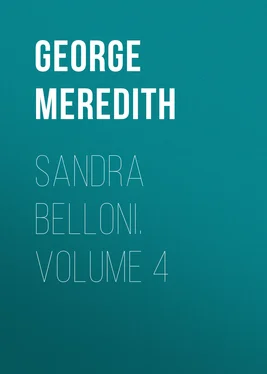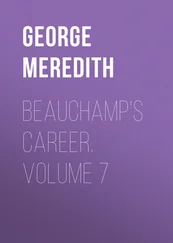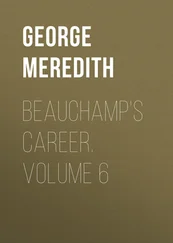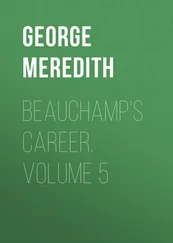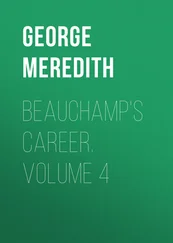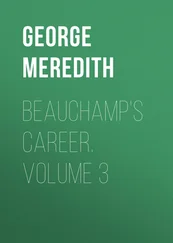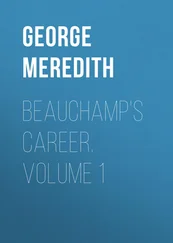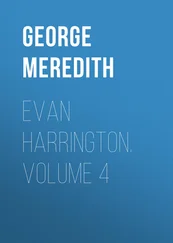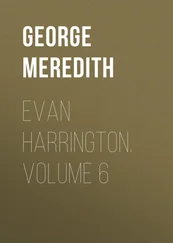George Meredith - Sandra Belloni. Volume 4
Здесь есть возможность читать онлайн «George Meredith - Sandra Belloni. Volume 4» — ознакомительный отрывок электронной книги совершенно бесплатно, а после прочтения отрывка купить полную версию. В некоторых случаях можно слушать аудио, скачать через торрент в формате fb2 и присутствует краткое содержание. Жанр: foreign_prose, literature_19, foreign_antique, на английском языке. Описание произведения, (предисловие) а так же отзывы посетителей доступны на портале библиотеки ЛибКат.
- Название:Sandra Belloni. Volume 4
- Автор:
- Жанр:
- Год:неизвестен
- ISBN:нет данных
- Рейтинг книги:3 / 5. Голосов: 1
-
Избранное:Добавить в избранное
- Отзывы:
-
Ваша оценка:
- 60
- 1
- 2
- 3
- 4
- 5
Sandra Belloni. Volume 4: краткое содержание, описание и аннотация
Предлагаем к чтению аннотацию, описание, краткое содержание или предисловие (зависит от того, что написал сам автор книги «Sandra Belloni. Volume 4»). Если вы не нашли необходимую информацию о книге — напишите в комментариях, мы постараемся отыскать её.
Sandra Belloni. Volume 4 — читать онлайн ознакомительный отрывок
Ниже представлен текст книги, разбитый по страницам. Система сохранения места последней прочитанной страницы, позволяет с удобством читать онлайн бесплатно книгу «Sandra Belloni. Volume 4», без необходимости каждый раз заново искать на чём Вы остановились. Поставьте закладку, и сможете в любой момент перейти на страницу, на которой закончили чтение.
Интервал:
Закладка:
"Where is sleep for you if you part us?"
Mr. Pole flung up his arms. "I insist upon your going to bed. Why shouldn't I sleep? Child's folly!"
Though he spoke so, his brain was in strings to his timorous ticking nerves; and he thought that it would be well to propitiate her and get her to utter some words that would not haunt his pillow.
"My dear girl! it's not my doing. I like you. I wish you well and happy. Very fond of you;—blame circumstances, not me." Then he murmured: "Are black spots on the eyelids a bad sign? I see big flakes of soot falling in a dark room."
Emilia's mated look fleeted. "You come between us, sir, because I have no money?"
"I tell you it's the boy's only chance to make his hit now." Mr. Pole stamped his foot angrily.
"And you make my Cornelia marry, though she loves another, as Wilfrid loves me, and if they do not obey you they are to be beggars! Is it you who can pray? Can you ever have good dreams? I saved my father from the sin, by leaving him. He wished to sell me. But my poor father had no money at all, and I can pardon him. Money was a bright thing to him: like other things to us. Mr. Pole! What will any one say for you!"
The unhappy merchant had made vehement efforts to perplex his hearing, that her words might be empty and not future dragons round his couch. He was looking forward to a night of sleep as a cure for the evil sensations besetting him—his only chance. The chance was going; and with the knowledge that it was unjustly torn from him—this one gleam of clear reason in his brain undimmed by the irritable storm which plucked him down—he cried out, to clear himself:—
"They are beggars, both, and all, if they don't marry before two months are out. I'm a beggar then. I'm ruined. I shan't have a penny. I'm in a workhouse. They are in good homes. They are safe, and thank their old father. Now, then; now. Shall I sleep?"
Emilia caught his staggering arm. The glazed light of his eyes went out. He sank into a chair; white as if life had issued with the secret of his life. Wonderful varying expressions had marked his features and the tones of his voice, while he was uttering that sharp, succinct confession; so that, strange as it sounded, every sentence fixed itself on her with incontrovertible force, and the meaning of the whole flashed through her mind. It struck her too awfully for speech. She held fast to his nerveless hand, and kneeling before him, listened for his long reluctant breathing.
The 'Shall I sleep?' seemed answered.
CHAPTER XXVII
For days after the foregoing scene, Brookfield was unconscious of what had befallen it. Wilfrid was trying his yacht, the ladies were preparing for the great pleasure-gathering on Besworth lawn, and shaping astute designs to exclude the presence of Mrs. Chump, for which they partly condemned themselves; but, as they said, "Only hear her!" The excitable woman was swelling from conjecture to certainty on a continuous public cry of, "'Pon my hon'r!—d'ye think little Belloni's gone and marrud Pole?"
Emilia's supposed flight had deeply grieved the ladies, when alarm and suspicion had subsided. Fear of some wretched male baseness on the part of their brother was happily diverted by a letter, wherein he desired them to come to him speedily. They attributed her conduct to dread of Mr. Pericles. That fervid devotee of Euterpe received the tidings with an obnoxious outburst, which made them seriously ask themselves (individually and in secret) whether he was not a moneyed brute, and nothing more. Nor could they satisfactorily answer the question. He raved: "You let her go. Ha! what creatures you are—hein? But you find not anozer in fifty years, I say; and here you stop, and forty hours pass by, and not a sing in motion. What blood you have! It is water—not blood. Such a voice, a verve, a style, an eye, a devil, zat girl! and all drawn up and out before ze time by a man: she is spoilt!"
He exhibited an anguish that they were not able to commiserate. Certain expressions falling from him led them to guess that he had set some plot in motion, which Emilia's flight had arrested; but his tragic outcries were all on the higher ground of the loss to Art. They were glad to see him go from the house. Soon he returned to demand Wilfrid's address. Arabella wrote it out for him with rebuking composure. Then he insisted upon having Captain Gambier's, whom he described as "ce nonchalant dandy."
"Him you will have a better opportunity of seeing by waiting here," said Adela; and the captain came before Mr. Pericles had retreated. "Ce nonchalant" was not quite true to his title, when he heard that Emilia had flown. He did not say much, but iterated "Gone!" with an elegant frown, adding, "She must come back, you know!" and was evidently more than commonly puzzled and vexed, pursuing the strain in a way that satisfied Mr. Pericles more thoroughly than Adela.
"She shall come back as soon as she has a collar," growled Mr. Pericles, meaning captivity.
"If she'd only come back with her own maiden name," interjected Mrs. Chump, "I'll give her a character; but, upon my hon'r—d'ye think ut possible, now…?"
Arabella talked over her, and rescued her father's name.
The noisy sympathy and wild speculations of the Tinleys and Copleys had to be endured. On the whole, the feeling toward Emilia was kind, and the hope that she would come to no harm was fervently expressed by all the ladies; frequently enough, also, to show the opinion that it might easily happen. On such points Mrs. Chump never failed to bring the conversation to a block. Supported as they were by Captain Gambier, Edward Buxley, Freshfield Sumner, and more than once by Sir Twickenham (whom Freshfield, launching angry shafts, now called the semi-betrothed, the statistical cripple, and other strong things that show a developing genius for street-cries and hustings—epithets in every member of the lists of the great Rejected, or of the jilted who can affect to be philosophical), notwithstanding these aids, the ladies of Brookfield were crushed by Mrs. Chump. Her main offence was, that she revived for them so much of themselves that they had buried. "Oh! the unutterably sordid City life!" It hung about her like a smell of London smoke. As a mere animal, they passed her by, and had almost come to a state of mind to pass her off. It was the phantom, or rather the embodiment of their First Circle, that they hated in the woman. She took heroes from the journals read by servant-maids; she thought highly of the Court of Aldermen; she went on public knees to the aristocracy; she was proud, in fact, of all City appetites. What, though none saw the peculiar sting? They felt it; and one virtue in possessing an 'ideal' is that, lodging in you as it does, it insists upon the interior being furnished by your personal satisfaction, and not by the blindness or stupidity of the outer world. Thus, in one direction, an ideal precludes humbug. The ladies might desire to cloak facts, but they had no pleasure in deception. They had the feminine power of extinguishing things disagreeable, so long as nature or the fates did them no violence. When these forces sent an emissary to confound them, as was clearly the case with Mrs. Chump, they fought. The dreadful creature insisted upon shows of maudlin affection that could not be accorded to her, so that she existed in a condition of preternatural sensitiveness. Among ladies pretending to dignity of life, the horror of acrid complaints alternating with public offers of love from a gross woman, may be pictured in the mind's eye. The absence of Mr. Pole and Wilfrid, which caused Mrs. Chump to chafe at the restraint imposed by the presence of males to whom she might not speak endearingly, and deprived the ladies of proper counsel, and what good may be at times in masculine authority, led to one fierce battle, wherein the great shot was fired on both sides. Mrs. Chump was requested to leave the house: she declined. Interrogated as to whether she remained as an enemy, knowing herself to be so looked upon, she said that she remained to save them from the dangers they invited. Those dangers she named, observing that Mrs. Lupin, their aunt, might know them, but was as liable to be sent to sleep by a fellow with a bag of jokes as a watchdog to be quieted by a bone. The allusion here was to Mrs. Lupin's painful, partially inexcusable, incurable sense of humour, especially when a gleam of it led to the prohibited passages of life. The poor lady was afflicted so keenly that, in instances where one of her sex and position in the social scale is bound to perish rather than let even the shadow of a laugh appear, or any sign of fleshly perception or sympathy peep out, she was seen to be mutely, shockingly, penitentially convulsed: a degrading sight. And albeit repeatedly remonstrated with, she, upon such occasions, invariably turned imploring glances—a sort of frowning entreaty—to the ladies, or to any of her sex present. "Did you not see that? Oh! can you resist it?" she seemed to gasp, as she made those fruitless efforts to drag them to her conscious level. "Sink thou, if thou wilt," was the phrase indicated to her. She had once thought her propensity innocent enough, and enjoyable. Her nieces had almost cured her, by sitting on her, until Mrs. Chump came to make her worst than ever. It is to be feared that Mrs. Chump was beginning to abuse her power over the little colourless lady. We cannot, when we find ourselves possessed of the gift of sending a creature into convulsions, avoid exercising it. Mrs. Lupin was one of the victims of the modern feminine 'ideal.' She was in mind merely a woman; devout and charitable, as her nieces admitted; but radically—what? They did not like to think, or to say, what;—repugnant, seemed to be the word. A woman who consented to perceive the double-meaning, who acknowledged its suggestions of a violation of decency laughable, and who could not restrain laughter, was, in their judgement, righteously a victim. After signal efforts to lift her up, the verdict was that their Aunt Lupin did no credit to her sex. If we conceive a timorous little body of finely-strung nerves, inclined to be gay, and shrewdly apprehensive, but depending for her opinion of herself upon those about her, we shall see that Mrs. Lupin's life was one of sorrow and scourges in the atmosphere of the 'ideal.' Never did nun of the cloister fight such a fight with the flesh, as this poor little woman, that she might not give offence to the Tribunal of the Nice Feelings which leads us to ask, "Is sentimentalism in our modern days taking the place of monasticism to mortify our poor humanity?" The sufferings of the Three of Brookfield under Mrs. Chump was not comparable to Mrs. Lupin's. The good little woman's soul withered at the self- contempt to which her nieces helped her daily. Laughter, far from expanding her heart and invigorating her frame, was a thing that she felt herself to be nourishing as a traitor in her bosom: and the worst was, that it came upon her like a reckless intoxication at times, possessing her as a devil might; and justifying itself, too, and daring to say, "Am I not Nature?" Mrs. Lupin shrank from the remembrance of those moments.
Читать дальшеИнтервал:
Закладка:
Похожие книги на «Sandra Belloni. Volume 4»
Представляем Вашему вниманию похожие книги на «Sandra Belloni. Volume 4» списком для выбора. Мы отобрали схожую по названию и смыслу литературу в надежде предоставить читателям больше вариантов отыскать новые, интересные, ещё непрочитанные произведения.
Обсуждение, отзывы о книге «Sandra Belloni. Volume 4» и просто собственные мнения читателей. Оставьте ваши комментарии, напишите, что Вы думаете о произведении, его смысле или главных героях. Укажите что конкретно понравилось, а что нет, и почему Вы так считаете.
